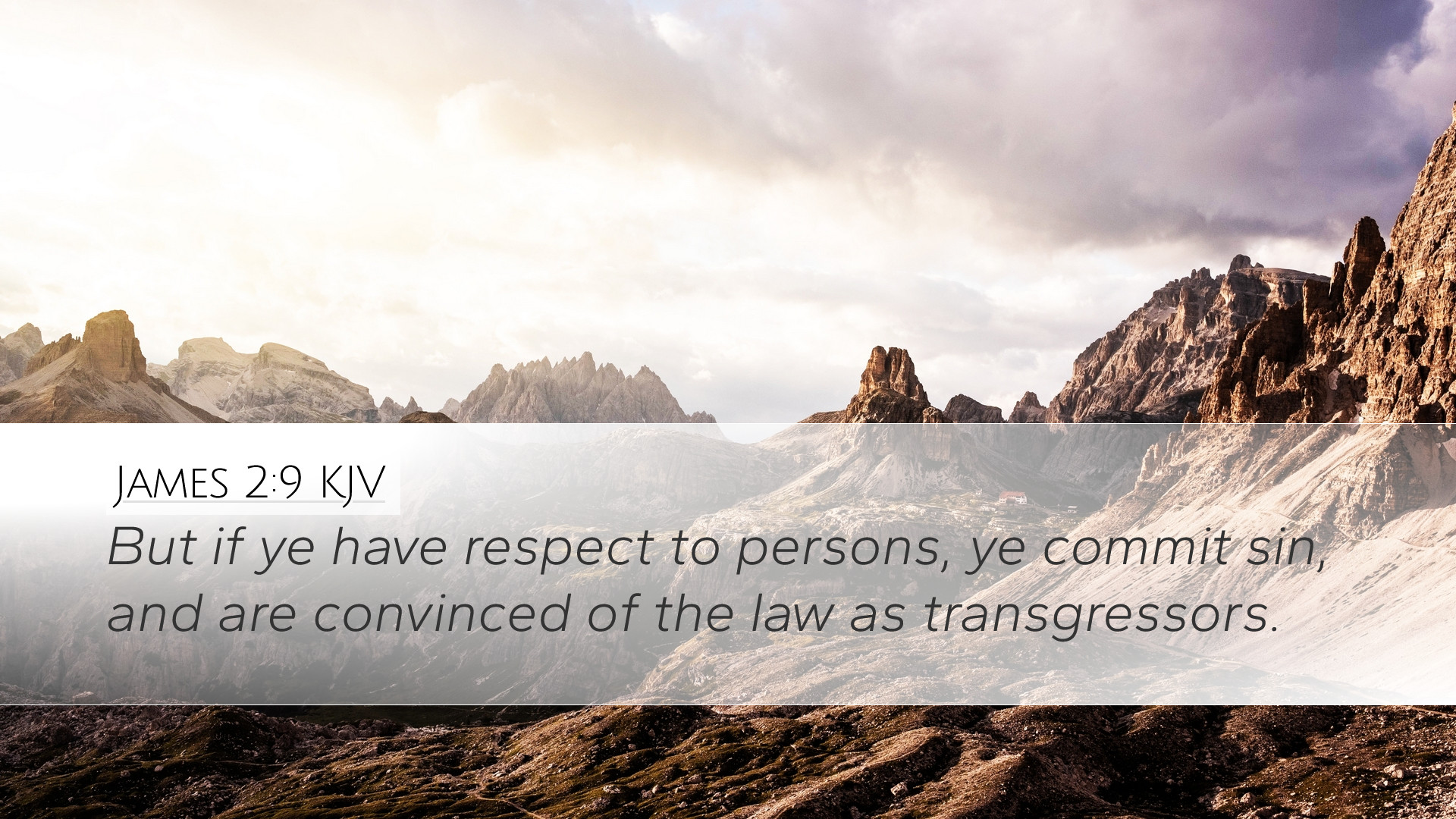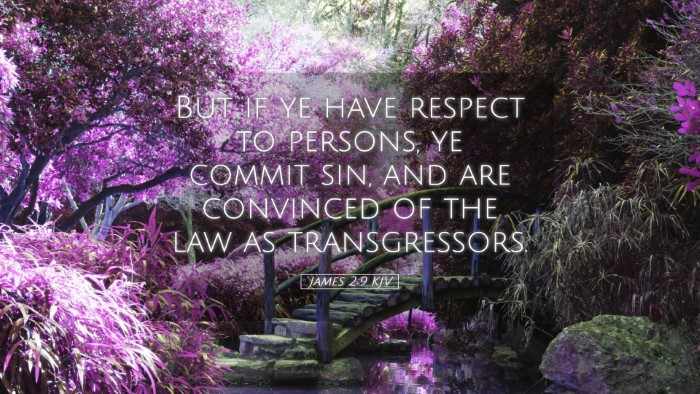Old Testament
Genesis Exodus Leviticus Numbers Deuteronomy Joshua Judges Ruth 1 Samuel 2 Samuel 1 Kings 2 Kings 1 Chronicles 2 Chronicles Ezra Nehemiah Esther Job Psalms Proverbs Ecclesiastes Song of Solomon Isaiah Jeremiah Lamentations Ezekiel Daniel Hosea Joel Amos Obadiah Jonah Micah Nahum Habakkuk Zephaniah Haggai Zechariah MalachiJames 2:9
James 2:9 KJV
But if ye have respect to persons, ye commit sin, and are convinced of the law as transgressors.
James 2:9 Bible Commentary
Commentary on James 2:9
Verse: "But if you show favoritism, you sin and are convicted by the law as lawbreakers."
Introduction
The epistle of James addresses the pressing issues of faith and works, particularly focusing on how believers should conduct themselves in ethical living. The verse in question, James 2:9, serves as a pivotal reminder of the danger of favoritism and its implications on both personal conduct and community life. This commentary synthesizes insights from various public domain commentaries to illuminate the depth of this scripture.
Contextual Analysis
James writes to a dispersed community of believers, urging them to live out their faith authentically. The preceding verses discuss the act of showing partiality toward the rich over the poor, a practice that was prevalent in the early church. Understanding the socioeconomic dynamics of the time is essential, as many early Christians were facing persecution and might have felt inclined to associate with those in positions of power for reasons of security and social standing.
Matthew Henry's Perspective
Matthew Henry emphasizes that favoritism reflects a lack of true faith and undermines the very essence of Christian love. He notes that such behavior arises from an improper judgment of others based on outward appearances. Henry asserts that showing partiality is fundamentally contrary to the gospel, which teaches that all stand equally before God, and that our worth is inherently linked to our spiritual state rather than our social status.
Albert Barnes' Insights
Albert Barnes elaborates on the implications of favoritism as a sin. He states that James categorically identifies the action of partiality as a violation of the "royal law," which is to love one's neighbor as oneself (James 2:8). In Barnes' view, the act of showing favoritism not only leads one to sin but also brings forth the convicting power of the law, serving as a reminder that all believers are accountable for their actions. His commentary encourages a self-reflective approach, compelling Christians to examine their interactions with others to ensure they embody the love of Christ.
Adam Clarke's Interpretation
Adam Clarke approaches this verse with a strong emphasis on the moral implications of partiality. He argues that favoritism can result in a significant breach of social ethics, ultimately dividing communities and fostering discord. Clarke points out that the term used for "favoritism" implies a judgment based solely on outward appearances, contrasting the Christian mandate to evaluate others through the lens of God's love and justice. He indicates that believers must combat this tendency through self-examination and adherence to Christ's teachings.
Theological Implications
This passage serves as a critical examination of the heart's posture towards others. The act of showing favoritism is not merely an external action; rather, it stems from internal dispositions that fail to recognize the inherent value of every individual. The theological implications suggest that all human beings are created in the image of God and should therefore be treated with dignity and respect, regardless of their socio-economic status.
Unity in Diversity
James 2:9 speaks powerfully to the theme of unity amidst diversity. In a multicultural and multi-class world, Christians are called to transcend societal divisions. The church, as Paul states in Galatians 3:28, is to reflect a community where there is neither Jew nor Gentile, neither slave nor free, nor male and female. This verse in James challenges believers to cultivate an inclusive spirit that mirrors the inclusive nature of the gospel.
The Role of the Law
The reference to the law in James 2:9 is crucial. According to Barnes, James points to the "royal law" found in Leviticus 19:18, which mandates love towards one's neighbor. The law is not seen merely as a set of moral obligations but as a guide that leads to spiritual maturity. When believers engage in favoritism, they not only break this law but also fail to embody the character of Christ, who consistently reached out to the marginalized and oppressed.
Practical Applications
To apply the teachings of James 2:9 practically, believers should consider the following:
- Self-Examination: Regularly assess one's own heart and relationships for signs of favoritism or bias. This involves acknowledging any prejudices that may influence behavior.
- Intentional Inclusion: Make a conscious effort to include those who are often overlooked—be it the poor, marginalized, or those differing in social status, ethnicity, or background.
- Promote Equity: Within church communities, advocate for equitable treatment and opportunities for all members, ensuring that no one is favored due to socio-economic advantages.
- Reflect on God’s Love: Meditate on the nature of God’s love, which is unconditional and inclusive, and aspire to reflect that love in interactions with others.
Conclusion
James 2:9 serves as a powerful exhortation against the sin of favoritism, challenging believers to uphold the principles of love, equality, and justice that are central to the Christian faith. By synthesizing insights from historical commentaries, we acknowledge the enduring relevance of this scripture for today's church. It beckons us to examine our hearts, reassess our priorities, and engage with our communities in a way that honors the image of God in every person.


